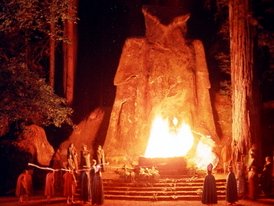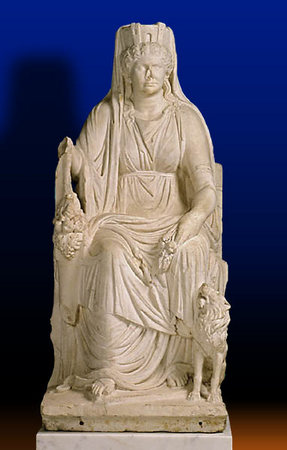Against Nature - para phusis
What Does That Mean
In Romans 1?
 |
Paul by Rembrandt.
The Apostle Paul
wrote 14 books
of our New Testament.
Against nature. Romans 1:26 says the women changed what was natural into that which is against nature. How would a first century Roman understand those words? A first century Roman would be more likely to understand Paul in the context of Testament of Naphtali, or Wisdom of Solomon or in the context of shrine prostitution, all Jewish viewpoints then current in Rome.
Certainly Paul’s first century readers did not understand his argument in the context of a twenty-first century, conservative Christian view of lesbianism and homosexuality. Obviously, Paul was not arguing that faithful, legal, gay marriages as we know them in the twenty first century, are wrong.
Lacking our twenty-first century, culturally based perspective on lesbianism and homosexuality, Paul’s first century readers would naturally conclude that the phrase, against nature, did not imply universal condemnation of committed, faithful, non-cultic gay marriages.
 |
Pagan temples of ancient Rome.
Paul’s first century readers would be more likely to believe that the phrase, against nature, referred to shrine prostitution or street prostitution or sex that was not procreative. Some of Paul's readers may also have understood Paul to be referring to pederasty or Roman orgies or women having sex with angels or women and men having sex with the gods, all common, first century viewpoints,.
Romans 1:26, “changing the natural use into that which is against nature” may refer to women having sexual relationships with angels or it may be Paul's restatement of the Jewish view, that non-procreative sex between men and women was unnatural.
The sex with angels viewpoint is based on Testament of Naphtali 3:3-5, a book commonly known when Paul wrote Romans. Testament of Naphtali, written around 137-107 BC, provides historical context for Paul's argument in Romans 1.
Dr. Robert Gagnon, the leading anti-gay author of the twenty first century, alleges that when T. Naphtali says: "changed the order of nature" and "changed the order of their nature," that refers to homosexuality. When you read the quote below, it is clear in the quote that T. Naphtali refers to inter-species sex (sex with fallen angels) and not to homosexuality.
 |
Sunbeams in
a forest glade.
Naphtali’s against nature reference spoke to the issue of "changing the order of their nature." It did NOT address male-female complementarity or lesbianism or homosexuality or bisexuality or transgender issues. Instead, the author of Testament of Naphtali warned against emulating ancient Sodom, which:
“changed the order of nature.”
Instead of condemning the men of Sodom for homosexuality, however, the author of T. Naphtali compares the sin of the people of Sodom to the sin of the Watchers (fallen angels, the sons of God in Genesis 6:2-13). These fallen angels changed the order of their nature and had sexual relations with the daughters of men. And the men of Sodom attempted to gang rape the angel visitors in Genesis 19. The connection is sex with angels, not homosexuality.
T. Naphtali references inter-species sexual practice - sex between angels and humans as against nature. What is condemned by the author of T. Naphtali, citing Genesis 6 and Genesis 19, is humans having or attempting to have, sexual relationships with angels.
 |
What is against nature (changing the order of their nature), according to the author of Testament of Naphtali (and probably what Paul referred to in Romans 1), is women having sexual relationships with angels.
Paul may also have been referring to heterosexual women who engaged in anal sex with their husbands, a practice viewed as against nature in ancient times because it was not procreative.
Or Paul may have been referring to the ancient practice of heterosexual women who engaged in anal sex with men to whom they were not married, to avoid pregnancy. This was regarded as against nature because it was not procreative.
This Jewish viewpoint is 2100 years old. It is not an attempt by modern gay Christians to find an excuse for ‘our sin.’ It is the record of history.
A first century Roman would be more likely to understand Paul in the context of Testament of Naphtali (humans having sex with angels) or in the context of shrine prostitution or in the context of heterosexuals having anal sex to avoid pregnancy.
It is not historically accurate to insist that Paul’s first century readers would understand him to be condemning the legal gay marriages with which we are familiar in the twenty-first century but which were not a common feature of first century Roman life.
The analogy in the Old Testament is polygamy. In the OT, polygamy was culturally accepted and legal and engaged in by some of God's most blessed followers. In the twenty first century, gay marriage is culturally accepted (like OT polygamy) and legal (like OT polygamy) and engaged in by many saved and born again gay Christians. We are washed in the blood of the Lamb, we are already seated in heavenly places in Christ Jesus, as Paul says in Ephesians 2:6 and we are already part of the body of Christ.
Here is the quotation
from Testament of Naphtali.
“3. Be ye not therefore eager to corrupt your doings through excess, or with empty words to deceive your souls; because if ye keep silence in purity of heart, ye shall be able to hold fast the will of God, and to cast away the will of the devil.
Sun and moon and stars change not their order; so also ye shall not change the law of God in the disorderliness of your doings. Nations went astray, and forsook the Lord, and changed their order, and followed stones and stocks, following after spirits of error.
But ye shall not be so, my children, recognizing in the firmament, in the earth, and in the sea, and in all created things, the Lord who made them all, that ye become not as Sodom, which changed the order of its nature.
In like manner also the Watchers changed the order of their nature, whom also the Lord cursed at the flood, and for their sake's made desolate the earth, that it should be uninhabited and fruitless."
Changing the order of nature described: forsaking God, doing the will of the devil, becoming idolaters, consorting with demons and earthly women cohabiting with fallen angels, Genesis 6:4-13. It had nothing to do with being gay or lesbian and nothing to do with gay marriage.
The Naphtali scroll would have
looked something like this.

The ancient author of Testament of Naphtali would vehemently disagree with the way modern anti-gay Christians misuse his words and rip them out of their historical context, so they can attack gays and lesbians.
The issue for the author of Testament of Naphtali was inter-species sexual practice - men attempting to have sex with angels - not a culturally accepted and legally accepted gay marriage and not gay relationships and certainly not male-female complementarity.
Paul Was Not Talking About Lesbians
And Gay Men In Romans 1:26-27.
 |
Dr. Robert Gagnon, Professor of Theology,
Houston Baptist University, formerly, for 23 years, a tenured professor at Pittsburg Theological Seminary.
Modern Complementarians like Dr. Gagnon believe Paul intended his readers to understand that every instance of lesbianism and homosexuality is against nature. Modern traditionalists interpret against nature to mean, against:
“the material shape of the created order and against the way God intended human beings to function.”
Is the modern traditional complementarian view grounded in historical fact or is it merely twenty-first century culture war spin, someone's opinion imposed on ancient documents?
Let’s review the
Complementarian argument.
- Men and women are anatomically complementary sexual beings but man and man or woman and woman are not.
- God never intended men to be homosexual or women to be lesbian.
- Therefore, complementarians allege, Paul, in Romans 1:26-27, must have intended to condemn homosexuality and lesbianism in general.
Every gay person can happily agree with the first point. Men and women are physically complementary sexual beings. That is the norm and everyone understands that. But it does not logically follow that God makes everyone heterosexual.
Jesus, in Matthew 19:10 tells us that some eunuchs are born that way "from their mother's womb." In ancient times, gay men and lesbians and even transgendered people were part of the group known as eunuchs.
 |
Wildflowers in Greece
- Complementarians believe homosexuality is contrary to the intent of the Creator as expressed in Genesis 2.
- Homosexuality is alleged to contradict the sexual complementarity of males and females in God’s original design.
- Homosexuality is alleged to contradict God’s plan for male-female sexual union.
- If everyone was gay, say complementarians, the human race would die out.
- Because gays don't reproduce, complementarians allege that homosexuality is rebellious and against nature, and therefore, scripture condemns it.
Gay Christians respond with
logic and common sense.
- Scripture condemns same sex shrine prostitution (a pagan religious fertility practice), not lesbianism and not homosexuality.Things different are not equal.
- Celibacy is as against nature as homosexuality.
- Celibacy negates the sexual complementarity of males and females because celibates neither engage in sexual activity nor reproduce.
- Celibacy is contrary to the intent of the Creator as expressed in Genesis 2.
- Celibacy intentionally rebels against God’s plan for male-female sexual union and procreation.
- If everyone was celibate, the human race would die out.
- If the Complementarian viewpoint is valid, we would expect scripture to condemn celibacy yet scripture commends celibacy, I Corinthians 7:7-8.
Perhaps Complementarians should
rethink their argument.
What did Paul mean when he used the words natural and against nature? The English words physics and physical are from the Greek words phusis and phusikos. In Latin, the words are natura and naturalis, so we translate phusis and phusikos as nature and natural.
- Natural-kata phusikos has a range of meaning including, "normal behavior, innate, inherent, instinctual, typical, customary, culturally accepted, the expected course of action."
- Against nature-para phusis has a similar range of meaning including, "contrary to what is normal behavior or innate or inherent or instinctual or typical or customary or contrary to what is culturally accepted or contrary to the expected course of action."

Pagan Roman temples.
Gentile Idolatry and
Fertility goddess Worship
Gentile idolaters went beyond their nature, by creating idols to worship, in effect taking the place of the Creator. These same Gentile idolaters went beyond their heterosexual nature by worshiping the fertility goddess (Cybele, for instance) through illicit, same sex religious rites.
To illustrate the depravity of the Gentiles in his argument, Paul describes illicit sexuality, a topic intimately familiar to everyone in first century Rome. In ancient Rome, this illicit sexuality manifested itself in five commonly known ways.
- Shrine prostitution
- Street prostitution
- Pederasty, an older male with a younger male
- Non-procreative sexual practice in Roman orgies.
- Humans having sex with angels or the gods.
Consequences of Idolatry - That's the argument Paul makes in Romans 1.
 |
If the point of Paul’s argument is to illustrate the sinful idolatry of the Gentiles and the sinful idolatry of the Jews, shrine prostitution as the effect of idolatry, perfectly fits his argument.
On the other hand, understanding vs. 26-27 as a universal proscription of lesbian and homosexual practice, apart from a shrine prostitution context, does not fit Paul’s argument. Instead, such a view imposes twenty-first century beliefs on a first century document. Remember our rule of interpretation.
Scripture cannot mean NOW
what it did not mean THEN.
If Paul was not talking about lesbians and gays when he wrote Romans 1, then that chapter is not talking about lesbians and gays today. The meaning of the Bible doesn't morph over time, to fit someone's culture war agenda.
 |
Molech Idol
The Bible deals with worship of the Canaanite fertility goddess under the rubric of Molech worship. Such worship of false gods is forbidden.
The context of Paul’s argument in Romans 1 is the history of Gentile and Jewish idolatry. Paul illustrates the sinfulness of the Gentiles by tracing their idol making, idol worship and refusal to retain the true God in their knowledge.
The effect of Gentile idolatry was a particular kind of illicit sexual practice, shrine prostitution, which is forbidden from Genesis to Revelation. In their desire to interpret Paul’s condemnation of shrine prostitution as an attack on all homosexual practice, Complementarians lose the logic of Paul’s argument by reading their twenty-first century culture war values into the text.
There is a better way to understand against nature as used by Paul in Romans 1 which is historically and scripturally accurate and which does not require the text-twisting Complementarians must do to support their interpretation.
Did Paul condemn lesbians
in Romans 1:26?
No, absolutely not.
 |
Pagan worshipers
at Molech shrine.
Complementarians believe Paul is condemning lesbian sexuality in Romans 1:26. They interpret against nature to mean lesbianism. Their understanding does not fit the rest of scripture since lesbians are never condemned in the Old Testament or the New Testament.
There is however, one female sexual practice which is condemned in the Old Testament, which is linked to Gentile idolatry and which perfectly fits Paul’s against nature argument. That sexual practice is female shrine prostitution, worshiping Ashtoreth, the fertility goddess consort of the fire-god Molech.
Qedesha-female shrine prostitutes, are mentioned in Genesis 38:21 & 22, Deuteronomy 23:17, and Hosea 4:14. It better fits the context of Romans to understand that Paul is referring to the illicit sexual practice of female shrine prostitutes who serviced men than that, suddenly and unaccountably, he injects into his letter, a one verse condemnation of lesbians.
Remember The Context
Of Paul’s Argument
 |
Cybele, known in first century Rome
as Mater Deum, "mother of the gods," employed shrine prostitutes in her worship.
The context of Paul’s argument in Romans 1 is Gentile idolatry, not lesbians and not gays.
The numerous Old Testament passages which condemn same sex shrine prostitution indicate a consistent long term trajectory of truth upon which Paul bases his anti-idolatry argument in Romans 1.
What is Paul’s point in Romans 1:26?
Has Paul suddenly deserted his argument about Gentile idolatry, so he can issue a one verse condemnation of lesbians? No, absolutely not. Romans 1:26 is the logical continuation of Paul’s argument about Gentile idolatry.
Romans 1:26-27 illustrates Paul's argument about idolatry. Paul never intended to blast lesbians and gays because he is not referencing lesbians and gays. He is condemning shrine prostitution as the visible effect of pagan idolatry.
Since Romans 1:26 continues Paul’s argument about Gentile idolatry, then the behavior Paul describes in v. 26 is related to Gentile idolatry.
Paul has not suddenly veered
from his idolatry argument,
so he can condemn lesbians.
Instead, Paul describes idolatrous behavior, shrine prostitution, which is against nature. God did not create human beings to worship false gods through shrine prostitution. God hates idol worship and God hates for His people to waste their lives worshiping idols. Idol worship and shrine prostitution are against nature and those are the twin behaviors Paul deplores in Romans 1:26.
Helpful Links To Excellent Information
About Being Gay And Christian
 |
From Against Nature, Return To GayChristian101Home Page.
Gay Christian 101 - Spiritual Self-Defense For Gay Christians.
There are four popular analogies to validate gays.
Jesus identified the sin of Sodom and it was not homosexuality.
The Holiness Code was aimed at Israel
What was a sodomite in the Bible?
Family Values in the Old Testament
Gay Christian 101 - Spiritual Self-Defense For Gay Christians.
Google Translate
into 90 languages
We are saved:
by grace alone through faith alone
Recent Articles
-
Gay Christian 101 - Affirming God's glorious good news for all LGBs.
Jan 08, 24 12:57 AM
Gay Lesbian Bisexual Christian 101 - Accurate biblical and historical info defending LGB Christians from the anti-gay crowd. -
Romans 1 describes ancient shrine prostitution, not gays and lesbians.
Dec 21, 23 04:37 PM
Romans 1, in historical context, is about ancient Roman fertility goddess worshipers who engaged in shrine prostitution to worship Cybele, not gays and lesbians. -
The Centurion And Pais - When Jesus Blessed A Gay Couple.
Nov 14, 23 10:32 PM
Centurion and Pais? If Jesus blessed a gay relationship, would this change your view of homosexuality?
Bible Study Resources
for eDisciples



